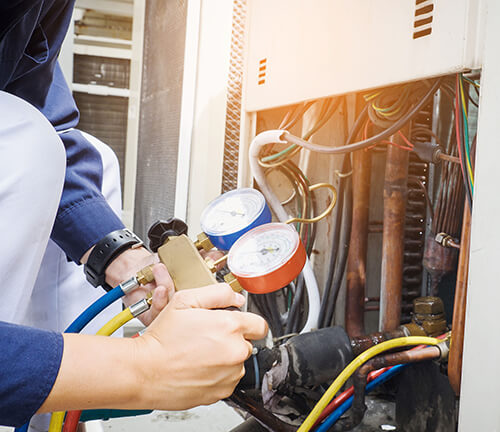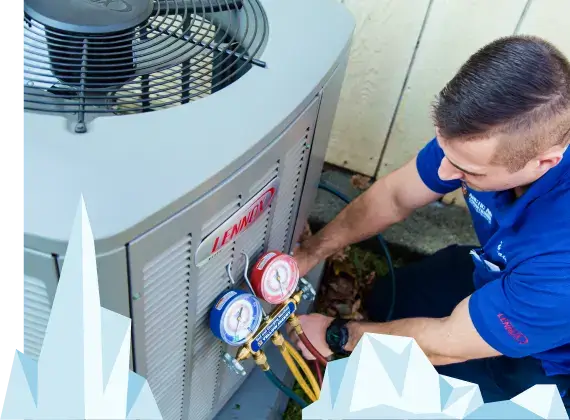Solve Heating Issues Quickly with DMAKS HVAC Repairs.
Solve Heating Issues Quickly with DMAKS HVAC Repairs.
Blog Article
Energy-Efficient Heating And Cooling Solutions to Conserve on Energy Bills
As energy costs remain to climb, the relevance of energy-efficient HVAC systems ends up being significantly evident. These systems not only guarantee substantial financial savings on utility expenses however also contribute to a much more sustainable future by lessening energy consumption. With different alternatives available, consisting of geothermal warmth pumps and ductless mini-splits, residential or commercial property proprietors face a wide variety of choices that can improve comfort and air high quality. Comprehending the key attributes and maintenance needs is vital to optimizing these advantages. What variables should be focused on when selecting the appropriate system for your needs?
Benefits of Energy-Efficient Heating And Cooling Solutions
Energy-efficient HVAC systems offer numerous advantages that prolong beyond simple expense savings. By eating less energy, these systems contribute to reduce greenhouse gas emissions, helping to fight climate change and promote sustainability.
In addition, energy-efficient heating and cooling systems commonly supply boosted comfort degrees. A lot of these systems include advanced technology that permits far better temperature level control and improved air top quality (DMAKS HVAC). This brings about a healthier indoor setting, which is particularly important for people with allergic reactions or respiratory problems
In addition, spending in energy-efficient a/c systems can enhance residential property worth. As more consumers prioritize energy effectiveness, homes and structures furnished with these systems may bring in higher proposals in the realty market.
Types of Energy-Efficient HVAC Options
How can house owners and businesses pick the most ideal energy-efficient HVAC options for their needs? The market provides a variety of energy-efficient a/c systems, each made to improve convenience while minimizing power usage.
One alternative is the variable cooling agent circulation (VRF) system, which successfully controls the temperature in multiple areas within a structure. This system adapts its cooling agent circulation to match the desired temperature, resulting in substantial energy cost savings.
One more popular selection is geothermal heatpump, which make use of the earth's stable temperature level to warm and trendy spaces. By transferring heat to and from the ground, these systems show outstanding effectiveness, particularly in moderate environments.
Additionally, ductless mini-split systems provide an energy-efficient option for homes lacking ductwork. These systems enable zone-specific heating & cooling, minimizing energy waste in empty locations.
Lastly, high-efficiency heating systems and a/c unit, with advanced SEER and AFUE scores, offer trustworthy climate control while eating less energy than typical models. By assessing these alternatives, property owners and businesses can pick a cooling and heating system tailored to their certain requirements and power effectiveness objectives.
Trick Features to Consider

Following, investigate the type of compressor utilized in the system. DMAKS HVAC. Variable-speed compressors can adjust their output to match the heating or cooling down need, leading to boosted convenience and power savings compared to single-speed versions. Furthermore, look for systems equipped with clever thermostats that supply programmable setups and remote access, permitting much better control over energy consumption
Another vital function is the system's air filtering ability. High-efficiency filters can enhance interior air top quality and minimize energy consumption by guaranteeing the system runs efficiently. Additionally, think about the sort of refrigerant utilized; modern-day systems typically employ environment-friendly refrigerants that have a reduced ecological impact.
Lastly, guarantee that the system works with zoning technology, which enables for tailored temperature level control in different areas of your home, improving convenience while minimizing energy usage.
Tips for Selecting the Right System


Following, consider energy performance ratings, particularly the Seasonal Energy Performance Proportion (SEER) for cooling down systems and the Yearly Gas Application Performance (AFUE) for home heating systems. Greater ratings indicate higher efficiency, which can lead to substantial savings on utility costs in time.
Furthermore, examine the type of heating and cooling system that ideal fits your way of life and spending plan. Alternatives include main air conditioning, ductless mini-splits, reference and heatpump, each with its very own collection of benefits and disadvantages.
Do not forget the significance of appropriate setup and sizing; an incorrectly sized system can bring about inefficiencies and boosted wear. Consult with a specialist Heating and cooling professional to get experienced suggestions customized to your home's special needs. This extensive approach will certainly guarantee that you pick an energy-efficient cooling and heating system that meets your requirements and budget plan effectively.
Maintenance for Ideal Performance
Once the ideal HVAC system remains in location, continuous maintenance comes to be key to guaranteeing ideal performance and longevity. A well-maintained system operates better, resulting in reduced power intake and reduced utility expenses. Normal evaluations and tune-ups should be set up at the very least twice a year-- once prior to the air conditioning season and when before the heating period.

Home owners must additionally be watchful about checking their heating and cooling system's performance. Uncommon noises, rising and fall temperature levels, or raised power costs can show underlying issues that call for prompt interest. By resolving these issues without delay, house owners can stop costly repair work and expand the life expectancy of their systems.
Purchasing a maintenance plan with a certified technician not just improves efficiency but additionally supplies comfort, knowing that the system is running at its finest. DMAKS HVAC. Normal maintenance is consequently essential for maintaining power efficiency and lowering general functional costs
Conclusion
In verdict, energy-efficient cooling and heating systems provide a practical solution for minimizing energy expenses while enhancing comfort and air top quality. By integrating innovative modern technologies and choices such as geothermal heatpump and ductless mini-splits, homeowner can attain significant power financial savings and add to environmental sustainability. Cautious consideration of system features and ongoing upkeep further guarantees optimum performance, making energy-efficient systems a prudent investment for both economic and environmental benefits.
Report this page